
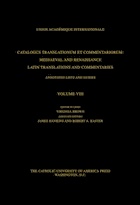
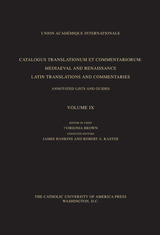
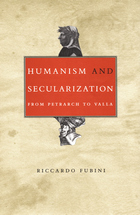
Humanism and Secularization offers a nuanced account of humanists contesting medieval ideas about authority not in order to reject Christianity or even orthodoxy, but to claim for themselves the right to define what it meant to be a Christian. Fubini analyzes key texts by major humanists—isuch as Petrarch, Poggio, and Valla—from the first century of the movement. As he subtly works out these authors’ views on religion and the Church from both biographical and textual information, Fubini reveals in detail the new historical consciousness that animated the humanists in their reading of classical and patristic texts. His book as a whole shows convincingly just how radical the humanism of the first half of the fifteenth century was and how sharply it challenged well-entrenched ideas and institutions. Appearing here in English for the first time, his work provides a model set of readings of humanist texts and a critical perspective on Italian humanism that will alter and enrich discussion and understanding of the nature of the humanist movement.
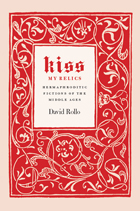
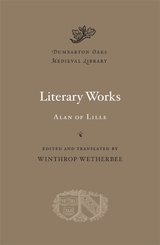
A product of the cathedral schools that played a foundational role in the so-called Twelfth-Century Renaissance, Alan of Lille was renowned for the vast learning which earned him the title of Doctor Universalis. His writings include many significant contributions to the development of systematic theology, but he was also the most important Latin poet of his time, the great age of Medieval Latin poetry. The works included in this volume aim to give imaginative expression to the main tenets of Alan’s theology, but the forms in which his vision is embodied are strikingly original and informed by a rich awareness of poetic tradition.
The “Sermon on the Intelligible Sphere” translates Platonist cosmology into the terms of a visionary psychology. In the Boethian dialogue of the De planctu Naturae the goddess Nature inveighs against sodomy and “unnatural” behavior generally. The Anticlaudianus, viewed as virtually a classic in its own day, is at once a summa of the scholastic achievement of the Twelfth-Century schools and an allegory of spiritual pilgrimage that anticipates the Divine Comedy.
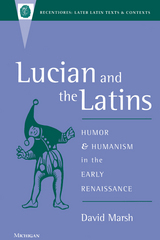
Until now, no study has attempted to connect the Latin translators and imitators of Lucian with his wider European influence. In Lucian and the Latins, David Marsh describes how Renaissance authors rediscovered the comic writings of Lucian. He traces how Lucianic themes and structures made an essential contribution to European literature beginning with a survey of Latin translations and imitations, which gave new direction to European letters in the fifteenth and sixteenth centuries. The Lucianic dialogues of the dead and dialogues of the gods were immensely popular, despite the religious backlash of the sixteenth century. The paradoxical encomium, represented by Lucian's "The Fly" and "The Parasite," inspired so-called serious humanists like Leonardo Bruni and Guarino of Verona. Lucian's "True Story" initiated the genre of the fantastic journey, which enjoyed considerable popularity during the Renaissance age of discovery. Humanist descendants of this work include Thomas More's Utopia and much of Rabelais' Pantagruel.
Lucian and the Latins will attract readers interested in a wide variety of subjects: the classical tradition, the early Italian Renaissance, the origins of modern European literature, and the uses of humor and satire as instruments of cultural critique.
David Marsh is Professor of Italian, Rutgers University.

“This new day, new joy, the consummation of toil and devotion with ever new and eternal rejoicing, required new words, new songs from all!”
So wrote Raymond of Aguilers, a Provençal priest, when an army of nobles, knights, footmen, and priests from across Europe managed to conquer Jerusalem after three years of traveling and fighting. And there certainly were new words and new songs. These settlers produced a hybrid Latin literature—a “Levantine Latinity”—distinct from that in Europe, and their new literary tradition both drew on and resisted Levantine Muslim, Christian, and Jewish cultures in the newly occupied territories.
This volume analyzes the literary and rhetorical techniques of well-known authors such as William of Tyre, literary compositions of communities of canons in the Kingdom of Jerusalem, and individual scholars in the Principality of Antioch. These varied sources reveal the coherent and increasingly sophisticated ways in which Crusader settlers responded to their new environment while maintaining ties with their homelands in western Europe. In a short time, Levantine Latinity emerged to form an indispensable part of the literary history of both the Near East and Europe.
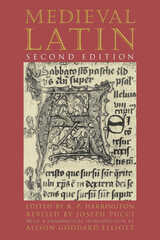
To help place the selections within their wider historical, social, and political contexts, Pucci has written extensive introductory essays for each of the new edition's five parts. Headnotes to individual selections have been recast as interpretive essays, and the original bibliographic paragraphs have been expanded. Reprinted from the best modern editions, the selections have been extensively glossed with grammatical notes geared toward students of classical Latin who may be reading medieval Latin for the first time.
Includes thirty-two full-page plates (with accompanying captions) depicting medieval manuscript and book production.
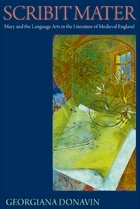
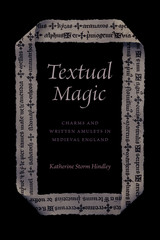
Katherine Storm Hindley explores words at their most powerful: words that people expected would physically change the world. Medieval Europeans often resorted to the use of spoken or written charms to ensure health or fend off danger. Hindley draws on an unprecedented archive of more than a thousand such charms from medieval England—more than twice the number gathered, transcribed, and edited in previous studies and including many texts still unknown to specialists on this topic. Focusing on charms from 1100 to 1350 CE as well as previously unstudied texts in Latin, French, and English, Hindley addresses important questions of how people thought about language, belief, and power. She describes seven hundred years of dynamic, shifting cultural landscapes, where multiple languages, alphabets, and modes of transmission gained and lost their protective and healing power. Where previous scholarship has bemoaned a lack of continuity in the English charms, Hindley finds surprising links between languages and eras, all without losing sight of the extraordinary variety of the medieval charm tradition: a continuous, deeply rooted part of the English Middle Ages.
READERS
Browse our collection.
PUBLISHERS
See BiblioVault's publisher services.
STUDENT SERVICES
Files for college accessibility offices.
UChicago Accessibility Resources
home | accessibility | search | about | contact us
BiblioVault ® 2001 - 2024
The University of Chicago Press









